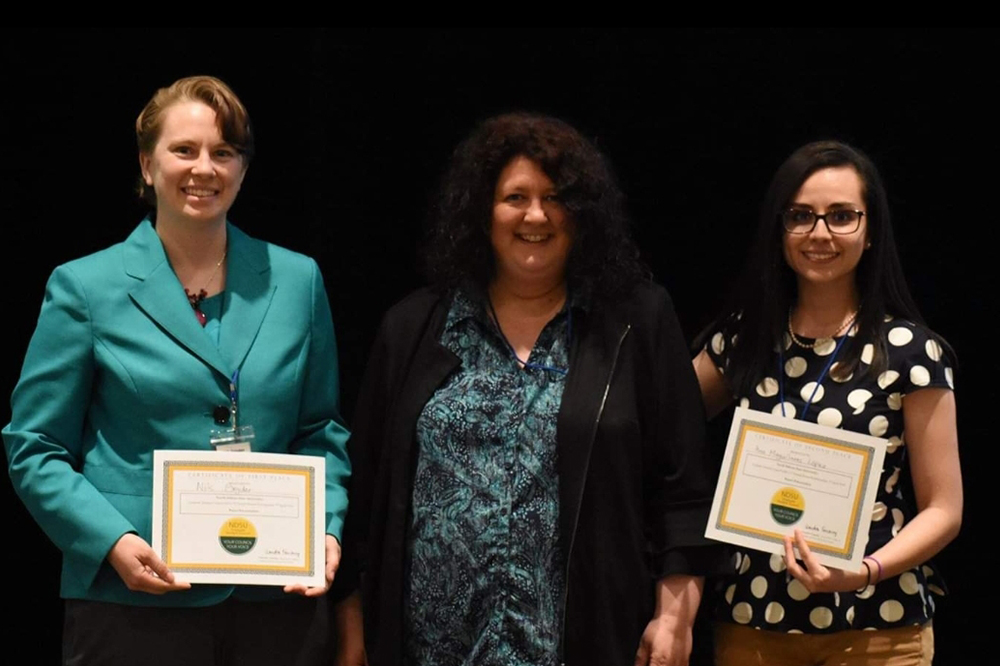Third annual GSC Symposium gives students a chance to feel a part of campus

Shoppers from all over the region peruse the various booths at the craft fair.
Graduate students have a tough job of always doing research, so receiving acknowledgement for their findings is appreciated. Being able to present their findings to a large crowd gives students a way of learning more and feeling more a part of campus.
On April 3, the third annual Graduate Student Council (GSC) Research Symposium took place to highlight the research being done at NDSU.
Adrienne Antonsen won for her oral presentation on “determining spatial and temporal distributions of grassland butterflies through statewide monitoring.” For the poster presentation, Ana Magallanes Lopez tied for first place with her presentation of “Can We Remove Vomitoxin From Wheat by Wet Milling?” with Nik Snyder who presented “Seasonal Trends In Nesting Physiology Of Adult Laughing Gulls (Leucophaeus Atricilla).”
Each contestant was shocked to hear they won and excited for the accomplishment. “I definitely didn’t expect to win,” Antonsen, entomology graduate student, said. “It took me by surprise.”
Antonsen entered the symposium to gain better public speaking skills and left explaining that it was all worth it. Not only was she able to win and share her findings, but she also found it interesting to learn more about what is happening behind the scenes at NDSU.
It definitely made me feel more of a part of NDSU
Adrienne Antonsen
Many students do not know all the research that is being conducted by graduate students because there is just so much. Antonsen explained how she got “such a bigger perspective on campus, research wise.”
“I think it kind of helps make me feel a part of a bigger thing,” Antonsen said.
Lopez agreed with this feeling. She was able to show the world what she was doing rather than being inside the lab working like she usually is.
“Whenever you have a chance to show your research, just go for it because it’s a very good opportunity to feel that your research is important,” Lopez said.
Before Lopez entered the competition, she felt like as though she couldn’t compete with those who were talking about cancer and diabetes because her research seemed important but did not compare to something so large like that. She has won multiple awards through competitions and conferences, and yet she still wondered if she should participate in the symposium. After almost two years of research, she felt compelled to share her findings at with the GSC.
When explaining how lengthy research is and how one must truly love what they are studying, Lopez explained the importance of studying different aspects in the world. “I think that’s the important thing of doing research — to have an impact,” she said.
While some studies have an impact on those learning, the symposium had an impact on Snyder. “GSC Symposium acts as a great cheerleader for graduate students and reinvigorated me, reminding me why I love my research,” Snyder said.
Many graduate students spend hours in their lab and years on their study, making them sacrifice parts of their lives for what they love to research, which is why winning awards for their work is so meaningful. It reminds them why they are doing the study, even if they ever felt as though it were becoming too heavy on their shoulders.
“Graduate work is tough. The award has encouraged me to continue,” Snyder said.
Because the symposium is not as intimidating as other competitions, it allows for students to practice for something that may have higher stakes. Snyder appreciated “the diversity of judges because this reaffirmed for me that I can still effectively communicate my science to a broad range of scientists.”
The symposium is a way to become more involved at NDSU, share research with others and practice communication skills for future events. The event helps prepare graduate students to share their research with the world and spread the word.
